Discussion on the Effects of Hospitals on Elderly Patients
VerifiedAdded on 2022/11/17
|7
|1735
|112
Discussion Board Post
AI Summary
This discussion board post examines the multifaceted effects of hospitalization on elderly patients. It addresses the increased health risks associated with hospitalization, including the development of acute diseases, psychological factors like depression, and the impact of limited mobility and under-nutrition. The post also delves into the risks and side effects of medications commonly administered to hospitalized elderly individuals, highlighting the potential for adverse drug reactions, nosocomial infections, and the impact on sleep cycles. Furthermore, the assignment discusses workplace bullying among nurses, exploring its causes, methods, and the negative consequences for patient safety and nurse well-being. The discussions also suggest various interventions and strategies to mitigate these issues, including nursing interventions, communication strategies, and approaches to relieve stress and prevent bullying.
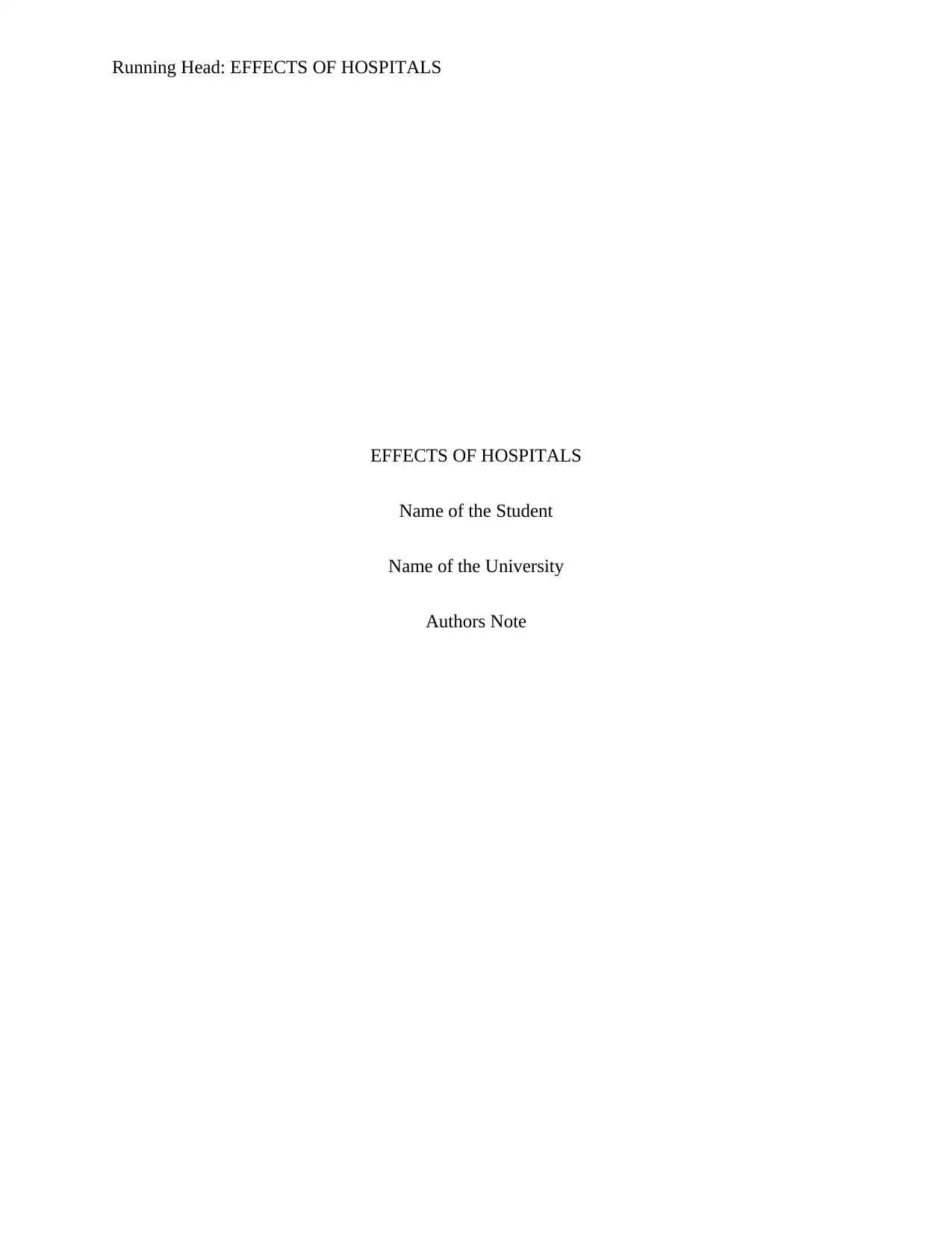
Running Head: EFFECTS OF HOSPITALS
EFFECTS OF HOSPITALS
Name of the Student
Name of the University
Authors Note
EFFECTS OF HOSPITALS
Name of the Student
Name of the University
Authors Note
Paraphrase This Document
Need a fresh take? Get an instant paraphrase of this document with our AI Paraphraser
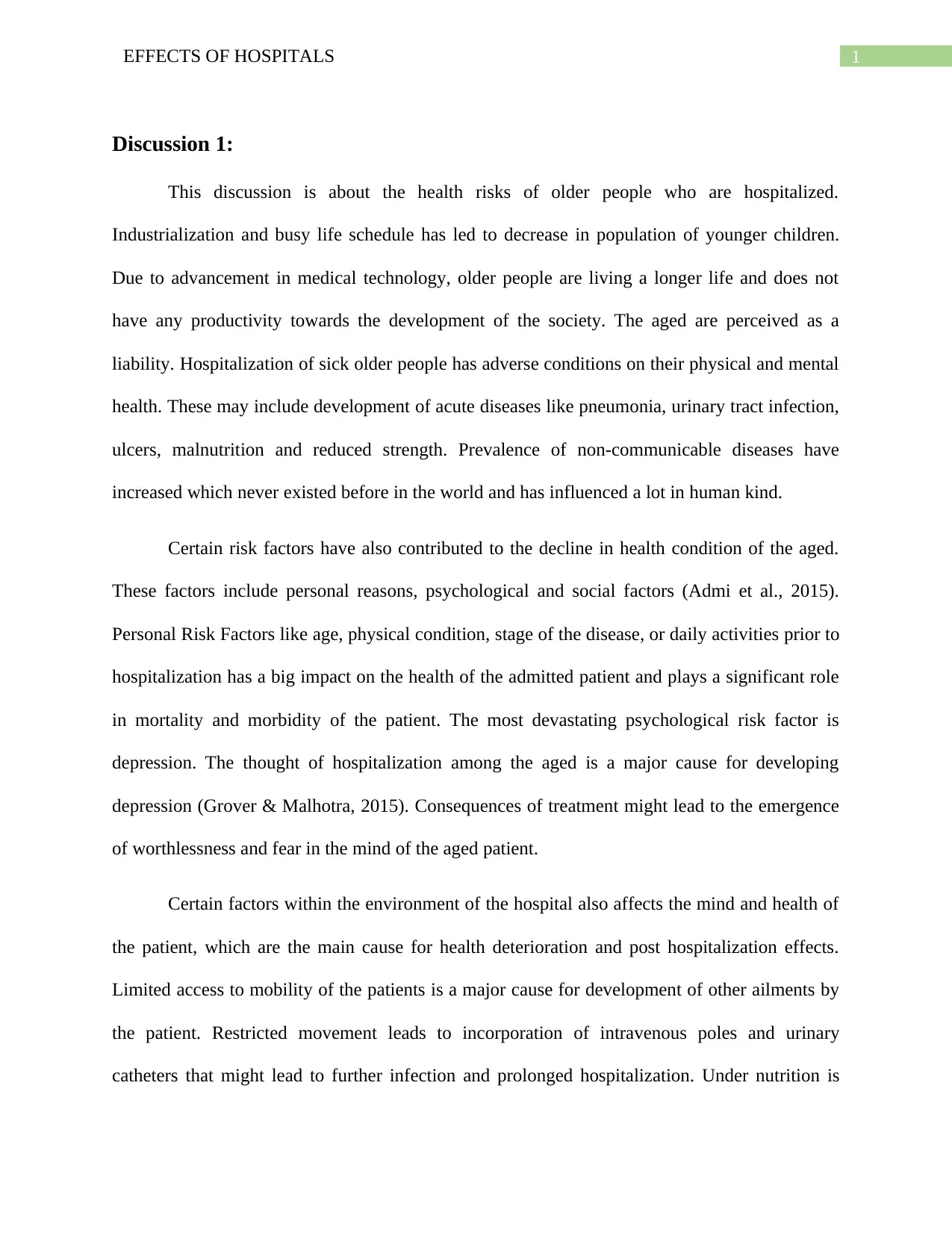
1EFFECTS OF HOSPITALS
Discussion 1:
This discussion is about the health risks of older people who are hospitalized.
Industrialization and busy life schedule has led to decrease in population of younger children.
Due to advancement in medical technology, older people are living a longer life and does not
have any productivity towards the development of the society. The aged are perceived as a
liability. Hospitalization of sick older people has adverse conditions on their physical and mental
health. These may include development of acute diseases like pneumonia, urinary tract infection,
ulcers, malnutrition and reduced strength. Prevalence of non-communicable diseases have
increased which never existed before in the world and has influenced a lot in human kind.
Certain risk factors have also contributed to the decline in health condition of the aged.
These factors include personal reasons, psychological and social factors (Admi et al., 2015).
Personal Risk Factors like age, physical condition, stage of the disease, or daily activities prior to
hospitalization has a big impact on the health of the admitted patient and plays a significant role
in mortality and morbidity of the patient. The most devastating psychological risk factor is
depression. The thought of hospitalization among the aged is a major cause for developing
depression (Grover & Malhotra, 2015). Consequences of treatment might lead to the emergence
of worthlessness and fear in the mind of the aged patient.
Certain factors within the environment of the hospital also affects the mind and health of
the patient, which are the main cause for health deterioration and post hospitalization effects.
Limited access to mobility of the patients is a major cause for development of other ailments by
the patient. Restricted movement leads to incorporation of intravenous poles and urinary
catheters that might lead to further infection and prolonged hospitalization. Under nutrition is
Discussion 1:
This discussion is about the health risks of older people who are hospitalized.
Industrialization and busy life schedule has led to decrease in population of younger children.
Due to advancement in medical technology, older people are living a longer life and does not
have any productivity towards the development of the society. The aged are perceived as a
liability. Hospitalization of sick older people has adverse conditions on their physical and mental
health. These may include development of acute diseases like pneumonia, urinary tract infection,
ulcers, malnutrition and reduced strength. Prevalence of non-communicable diseases have
increased which never existed before in the world and has influenced a lot in human kind.
Certain risk factors have also contributed to the decline in health condition of the aged.
These factors include personal reasons, psychological and social factors (Admi et al., 2015).
Personal Risk Factors like age, physical condition, stage of the disease, or daily activities prior to
hospitalization has a big impact on the health of the admitted patient and plays a significant role
in mortality and morbidity of the patient. The most devastating psychological risk factor is
depression. The thought of hospitalization among the aged is a major cause for developing
depression (Grover & Malhotra, 2015). Consequences of treatment might lead to the emergence
of worthlessness and fear in the mind of the aged patient.
Certain factors within the environment of the hospital also affects the mind and health of
the patient, which are the main cause for health deterioration and post hospitalization effects.
Limited access to mobility of the patients is a major cause for development of other ailments by
the patient. Restricted movement leads to incorporation of intravenous poles and urinary
catheters that might lead to further infection and prolonged hospitalization. Under nutrition is
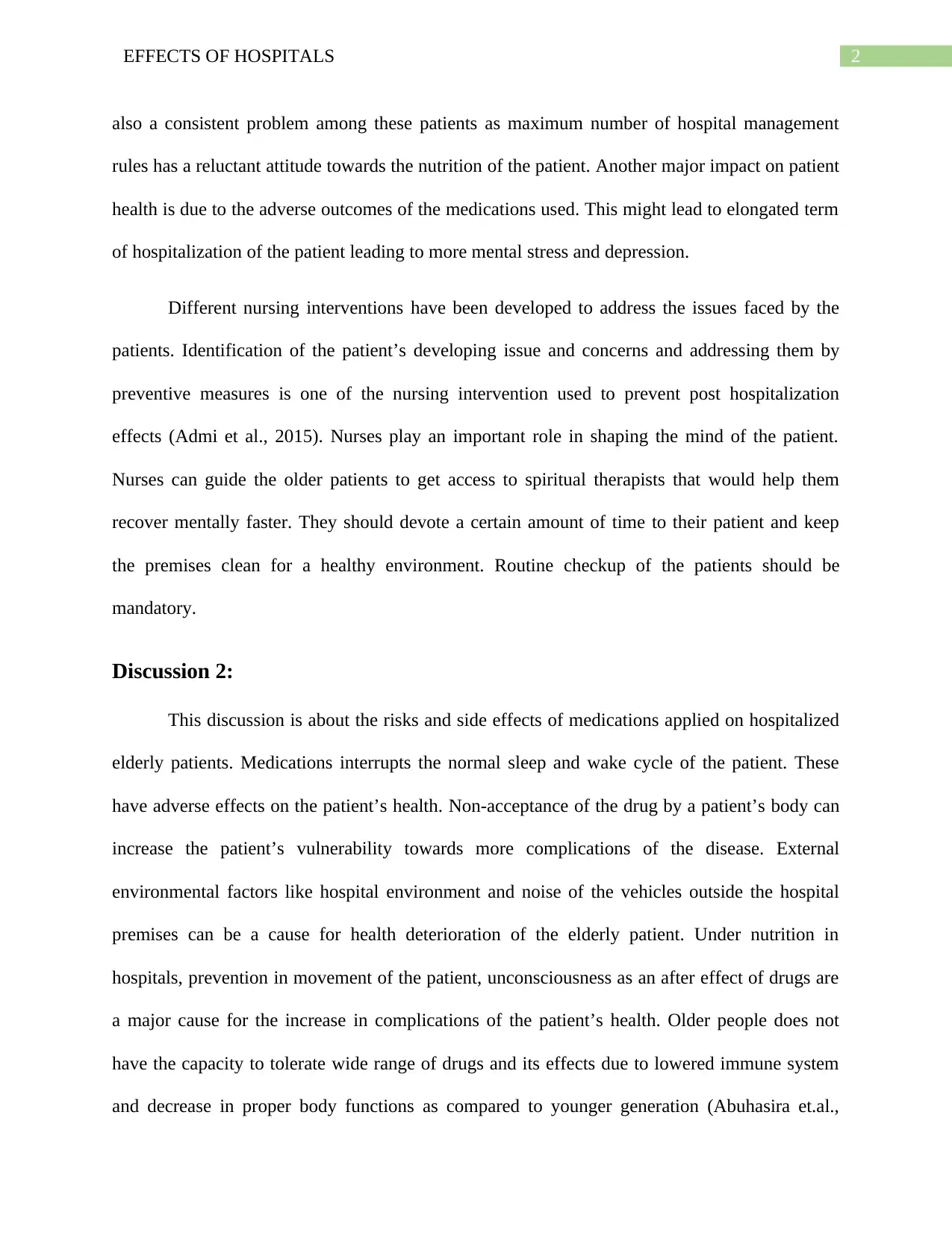
2EFFECTS OF HOSPITALS
also a consistent problem among these patients as maximum number of hospital management
rules has a reluctant attitude towards the nutrition of the patient. Another major impact on patient
health is due to the adverse outcomes of the medications used. This might lead to elongated term
of hospitalization of the patient leading to more mental stress and depression.
Different nursing interventions have been developed to address the issues faced by the
patients. Identification of the patient’s developing issue and concerns and addressing them by
preventive measures is one of the nursing intervention used to prevent post hospitalization
effects (Admi et al., 2015). Nurses play an important role in shaping the mind of the patient.
Nurses can guide the older patients to get access to spiritual therapists that would help them
recover mentally faster. They should devote a certain amount of time to their patient and keep
the premises clean for a healthy environment. Routine checkup of the patients should be
mandatory.
Discussion 2:
This discussion is about the risks and side effects of medications applied on hospitalized
elderly patients. Medications interrupts the normal sleep and wake cycle of the patient. These
have adverse effects on the patient’s health. Non-acceptance of the drug by a patient’s body can
increase the patient’s vulnerability towards more complications of the disease. External
environmental factors like hospital environment and noise of the vehicles outside the hospital
premises can be a cause for health deterioration of the elderly patient. Under nutrition in
hospitals, prevention in movement of the patient, unconsciousness as an after effect of drugs are
a major cause for the increase in complications of the patient’s health. Older people does not
have the capacity to tolerate wide range of drugs and its effects due to lowered immune system
and decrease in proper body functions as compared to younger generation (Abuhasira et.al.,
also a consistent problem among these patients as maximum number of hospital management
rules has a reluctant attitude towards the nutrition of the patient. Another major impact on patient
health is due to the adverse outcomes of the medications used. This might lead to elongated term
of hospitalization of the patient leading to more mental stress and depression.
Different nursing interventions have been developed to address the issues faced by the
patients. Identification of the patient’s developing issue and concerns and addressing them by
preventive measures is one of the nursing intervention used to prevent post hospitalization
effects (Admi et al., 2015). Nurses play an important role in shaping the mind of the patient.
Nurses can guide the older patients to get access to spiritual therapists that would help them
recover mentally faster. They should devote a certain amount of time to their patient and keep
the premises clean for a healthy environment. Routine checkup of the patients should be
mandatory.
Discussion 2:
This discussion is about the risks and side effects of medications applied on hospitalized
elderly patients. Medications interrupts the normal sleep and wake cycle of the patient. These
have adverse effects on the patient’s health. Non-acceptance of the drug by a patient’s body can
increase the patient’s vulnerability towards more complications of the disease. External
environmental factors like hospital environment and noise of the vehicles outside the hospital
premises can be a cause for health deterioration of the elderly patient. Under nutrition in
hospitals, prevention in movement of the patient, unconsciousness as an after effect of drugs are
a major cause for the increase in complications of the patient’s health. Older people does not
have the capacity to tolerate wide range of drugs and its effects due to lowered immune system
and decrease in proper body functions as compared to younger generation (Abuhasira et.al.,
⊘ This is a preview!⊘
Do you want full access?
Subscribe today to unlock all pages.

Trusted by 1+ million students worldwide
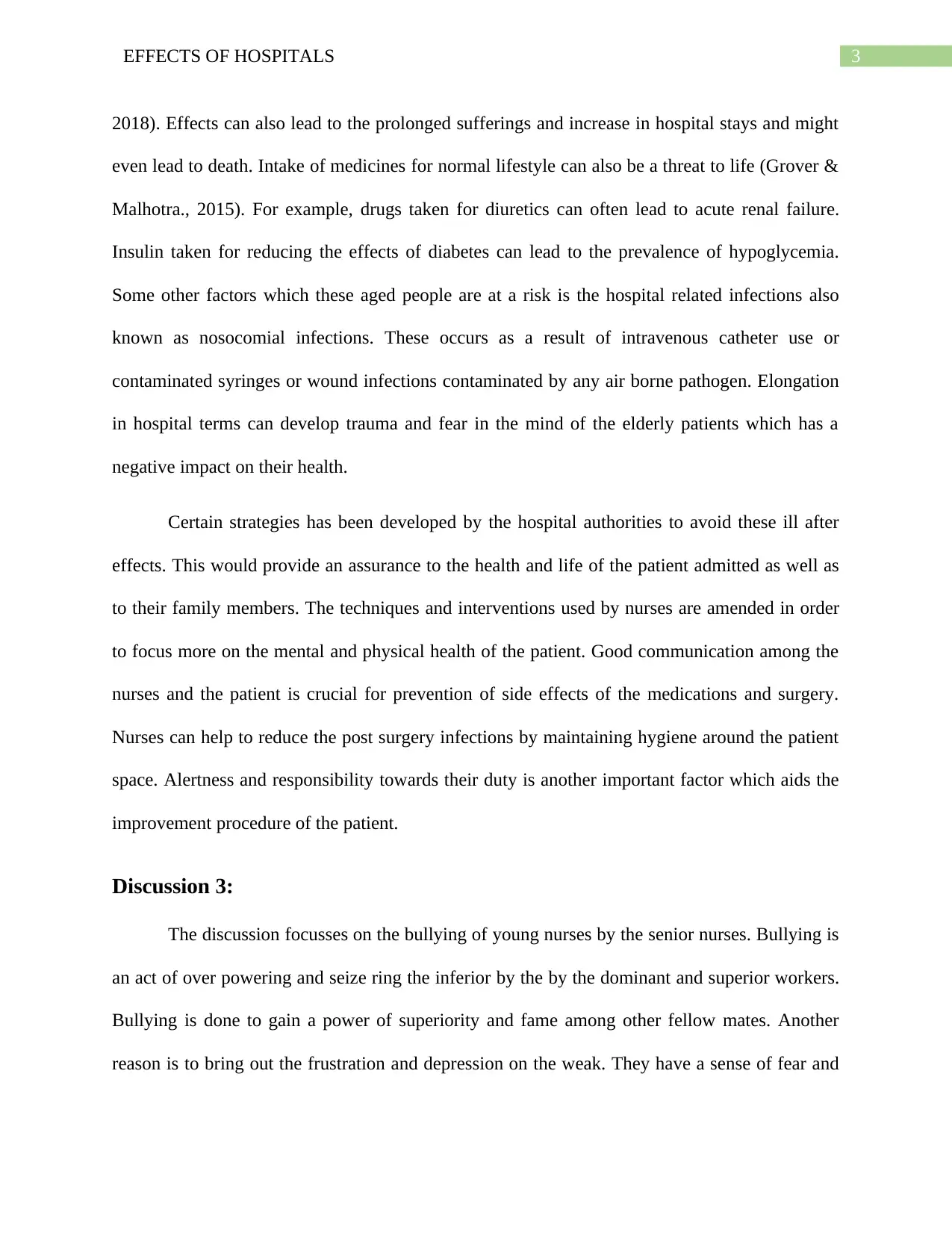
3EFFECTS OF HOSPITALS
2018). Effects can also lead to the prolonged sufferings and increase in hospital stays and might
even lead to death. Intake of medicines for normal lifestyle can also be a threat to life (Grover &
Malhotra., 2015). For example, drugs taken for diuretics can often lead to acute renal failure.
Insulin taken for reducing the effects of diabetes can lead to the prevalence of hypoglycemia.
Some other factors which these aged people are at a risk is the hospital related infections also
known as nosocomial infections. These occurs as a result of intravenous catheter use or
contaminated syringes or wound infections contaminated by any air borne pathogen. Elongation
in hospital terms can develop trauma and fear in the mind of the elderly patients which has a
negative impact on their health.
Certain strategies has been developed by the hospital authorities to avoid these ill after
effects. This would provide an assurance to the health and life of the patient admitted as well as
to their family members. The techniques and interventions used by nurses are amended in order
to focus more on the mental and physical health of the patient. Good communication among the
nurses and the patient is crucial for prevention of side effects of the medications and surgery.
Nurses can help to reduce the post surgery infections by maintaining hygiene around the patient
space. Alertness and responsibility towards their duty is another important factor which aids the
improvement procedure of the patient.
Discussion 3:
The discussion focusses on the bullying of young nurses by the senior nurses. Bullying is
an act of over powering and seize ring the inferior by the by the dominant and superior workers.
Bullying is done to gain a power of superiority and fame among other fellow mates. Another
reason is to bring out the frustration and depression on the weak. They have a sense of fear and
2018). Effects can also lead to the prolonged sufferings and increase in hospital stays and might
even lead to death. Intake of medicines for normal lifestyle can also be a threat to life (Grover &
Malhotra., 2015). For example, drugs taken for diuretics can often lead to acute renal failure.
Insulin taken for reducing the effects of diabetes can lead to the prevalence of hypoglycemia.
Some other factors which these aged people are at a risk is the hospital related infections also
known as nosocomial infections. These occurs as a result of intravenous catheter use or
contaminated syringes or wound infections contaminated by any air borne pathogen. Elongation
in hospital terms can develop trauma and fear in the mind of the elderly patients which has a
negative impact on their health.
Certain strategies has been developed by the hospital authorities to avoid these ill after
effects. This would provide an assurance to the health and life of the patient admitted as well as
to their family members. The techniques and interventions used by nurses are amended in order
to focus more on the mental and physical health of the patient. Good communication among the
nurses and the patient is crucial for prevention of side effects of the medications and surgery.
Nurses can help to reduce the post surgery infections by maintaining hygiene around the patient
space. Alertness and responsibility towards their duty is another important factor which aids the
improvement procedure of the patient.
Discussion 3:
The discussion focusses on the bullying of young nurses by the senior nurses. Bullying is
an act of over powering and seize ring the inferior by the by the dominant and superior workers.
Bullying is done to gain a power of superiority and fame among other fellow mates. Another
reason is to bring out the frustration and depression on the weak. They have a sense of fear and
Paraphrase This Document
Need a fresh take? Get an instant paraphrase of this document with our AI Paraphraser
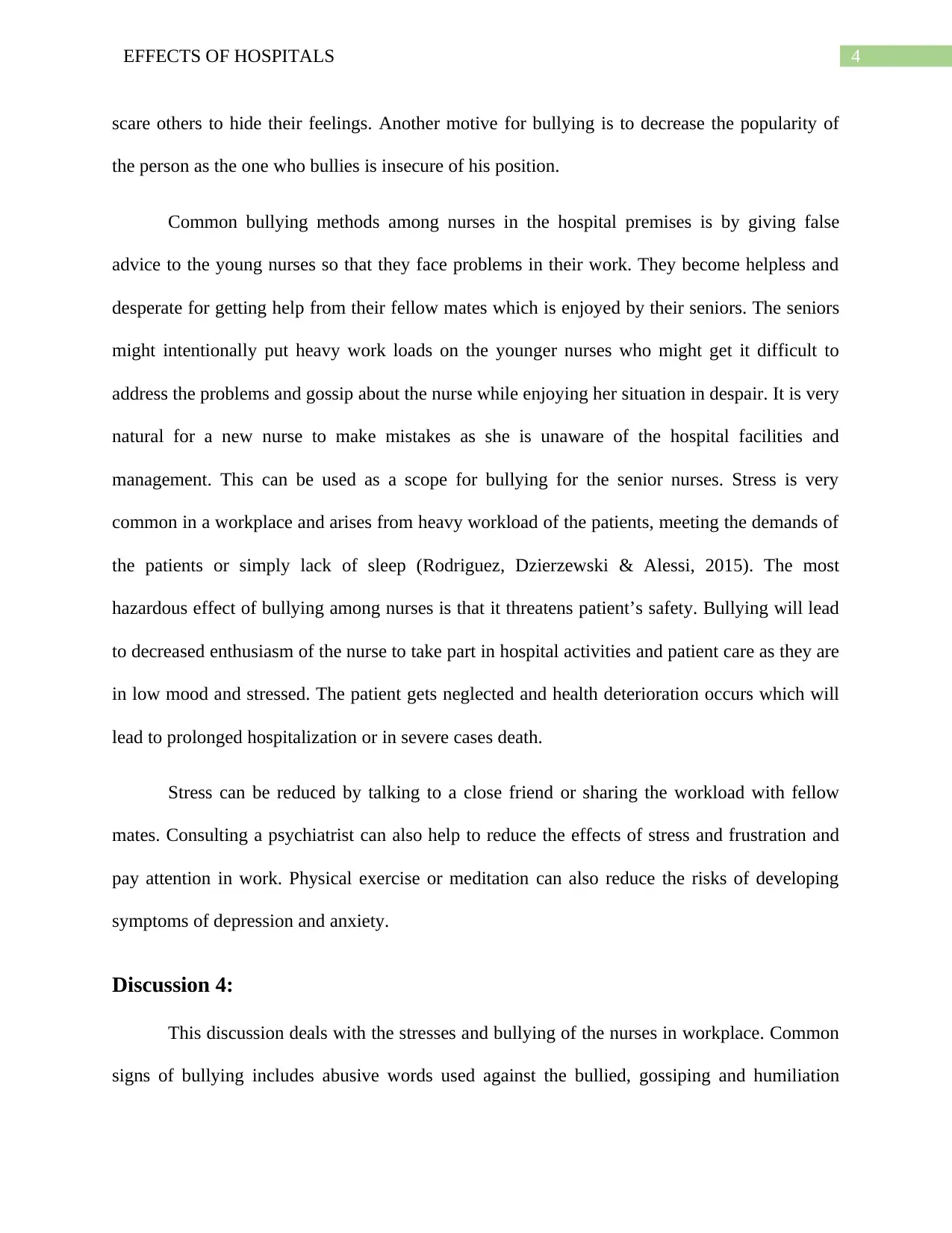
4EFFECTS OF HOSPITALS
scare others to hide their feelings. Another motive for bullying is to decrease the popularity of
the person as the one who bullies is insecure of his position.
Common bullying methods among nurses in the hospital premises is by giving false
advice to the young nurses so that they face problems in their work. They become helpless and
desperate for getting help from their fellow mates which is enjoyed by their seniors. The seniors
might intentionally put heavy work loads on the younger nurses who might get it difficult to
address the problems and gossip about the nurse while enjoying her situation in despair. It is very
natural for a new nurse to make mistakes as she is unaware of the hospital facilities and
management. This can be used as a scope for bullying for the senior nurses. Stress is very
common in a workplace and arises from heavy workload of the patients, meeting the demands of
the patients or simply lack of sleep (Rodriguez, Dzierzewski & Alessi, 2015). The most
hazardous effect of bullying among nurses is that it threatens patient’s safety. Bullying will lead
to decreased enthusiasm of the nurse to take part in hospital activities and patient care as they are
in low mood and stressed. The patient gets neglected and health deterioration occurs which will
lead to prolonged hospitalization or in severe cases death.
Stress can be reduced by talking to a close friend or sharing the workload with fellow
mates. Consulting a psychiatrist can also help to reduce the effects of stress and frustration and
pay attention in work. Physical exercise or meditation can also reduce the risks of developing
symptoms of depression and anxiety.
Discussion 4:
This discussion deals with the stresses and bullying of the nurses in workplace. Common
signs of bullying includes abusive words used against the bullied, gossiping and humiliation
scare others to hide their feelings. Another motive for bullying is to decrease the popularity of
the person as the one who bullies is insecure of his position.
Common bullying methods among nurses in the hospital premises is by giving false
advice to the young nurses so that they face problems in their work. They become helpless and
desperate for getting help from their fellow mates which is enjoyed by their seniors. The seniors
might intentionally put heavy work loads on the younger nurses who might get it difficult to
address the problems and gossip about the nurse while enjoying her situation in despair. It is very
natural for a new nurse to make mistakes as she is unaware of the hospital facilities and
management. This can be used as a scope for bullying for the senior nurses. Stress is very
common in a workplace and arises from heavy workload of the patients, meeting the demands of
the patients or simply lack of sleep (Rodriguez, Dzierzewski & Alessi, 2015). The most
hazardous effect of bullying among nurses is that it threatens patient’s safety. Bullying will lead
to decreased enthusiasm of the nurse to take part in hospital activities and patient care as they are
in low mood and stressed. The patient gets neglected and health deterioration occurs which will
lead to prolonged hospitalization or in severe cases death.
Stress can be reduced by talking to a close friend or sharing the workload with fellow
mates. Consulting a psychiatrist can also help to reduce the effects of stress and frustration and
pay attention in work. Physical exercise or meditation can also reduce the risks of developing
symptoms of depression and anxiety.
Discussion 4:
This discussion deals with the stresses and bullying of the nurses in workplace. Common
signs of bullying includes abusive words used against the bullied, gossiping and humiliation
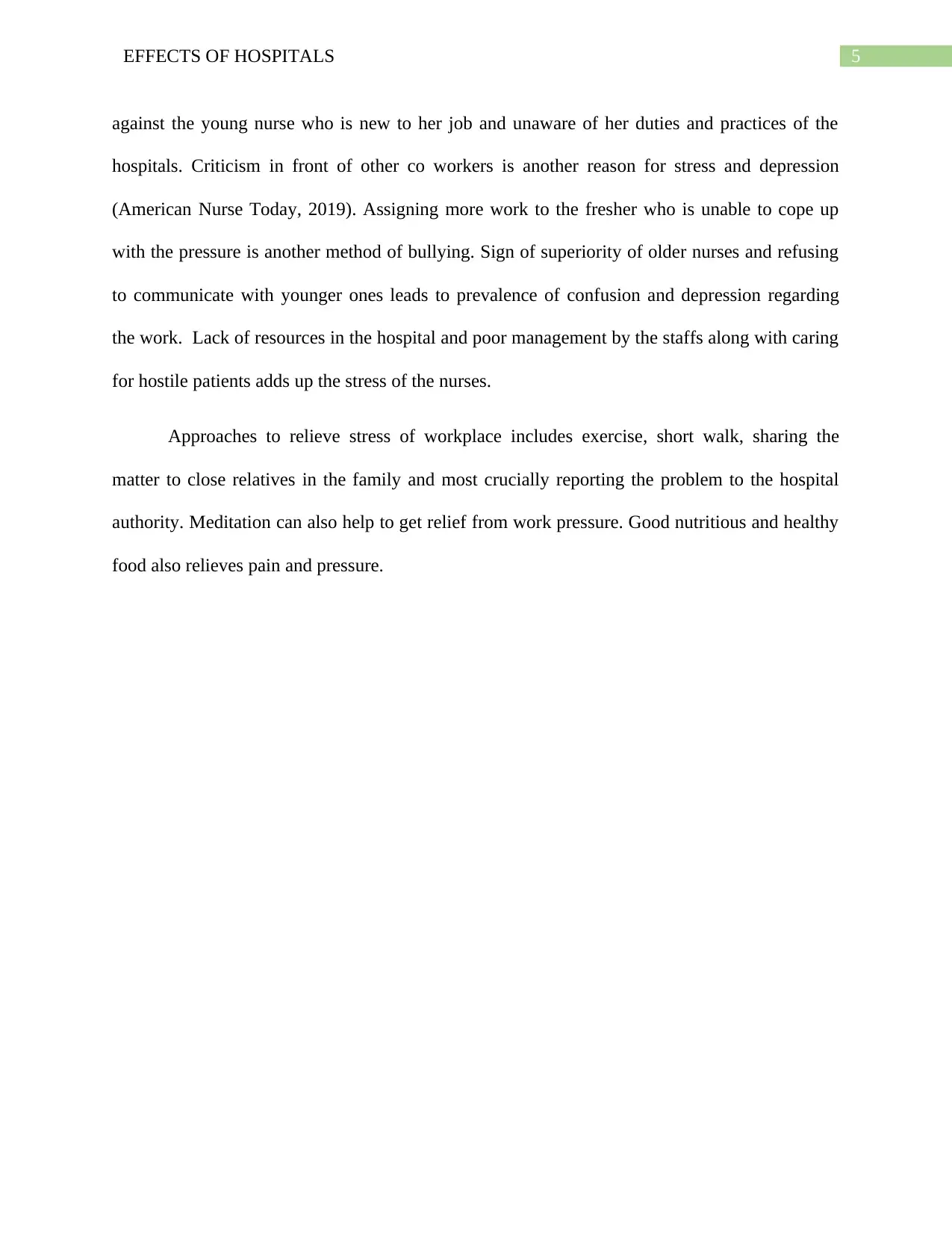
5EFFECTS OF HOSPITALS
against the young nurse who is new to her job and unaware of her duties and practices of the
hospitals. Criticism in front of other co workers is another reason for stress and depression
(American Nurse Today, 2019). Assigning more work to the fresher who is unable to cope up
with the pressure is another method of bullying. Sign of superiority of older nurses and refusing
to communicate with younger ones leads to prevalence of confusion and depression regarding
the work. Lack of resources in the hospital and poor management by the staffs along with caring
for hostile patients adds up the stress of the nurses.
Approaches to relieve stress of workplace includes exercise, short walk, sharing the
matter to close relatives in the family and most crucially reporting the problem to the hospital
authority. Meditation can also help to get relief from work pressure. Good nutritious and healthy
food also relieves pain and pressure.
against the young nurse who is new to her job and unaware of her duties and practices of the
hospitals. Criticism in front of other co workers is another reason for stress and depression
(American Nurse Today, 2019). Assigning more work to the fresher who is unable to cope up
with the pressure is another method of bullying. Sign of superiority of older nurses and refusing
to communicate with younger ones leads to prevalence of confusion and depression regarding
the work. Lack of resources in the hospital and poor management by the staffs along with caring
for hostile patients adds up the stress of the nurses.
Approaches to relieve stress of workplace includes exercise, short walk, sharing the
matter to close relatives in the family and most crucially reporting the problem to the hospital
authority. Meditation can also help to get relief from work pressure. Good nutritious and healthy
food also relieves pain and pressure.
⊘ This is a preview!⊘
Do you want full access?
Subscribe today to unlock all pages.

Trusted by 1+ million students worldwide
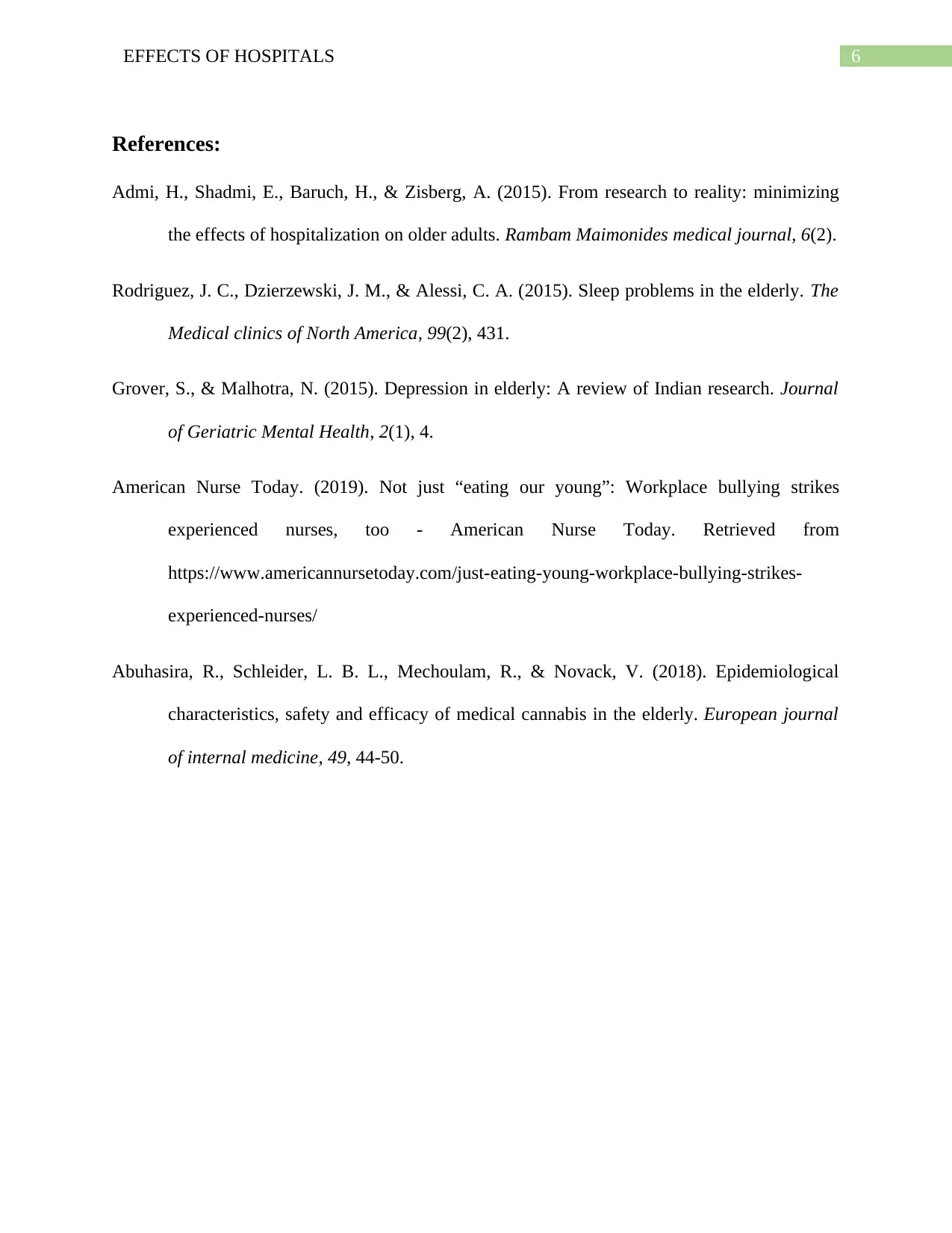
6EFFECTS OF HOSPITALS
References:
Admi, H., Shadmi, E., Baruch, H., & Zisberg, A. (2015). From research to reality: minimizing
the effects of hospitalization on older adults. Rambam Maimonides medical journal, 6(2).
Rodriguez, J. C., Dzierzewski, J. M., & Alessi, C. A. (2015). Sleep problems in the elderly. The
Medical clinics of North America, 99(2), 431.
Grover, S., & Malhotra, N. (2015). Depression in elderly: A review of Indian research. Journal
of Geriatric Mental Health, 2(1), 4.
American Nurse Today. (2019). Not just “eating our young”: Workplace bullying strikes
experienced nurses, too - American Nurse Today. Retrieved from
https://www.americannursetoday.com/just-eating-young-workplace-bullying-strikes-
experienced-nurses/
Abuhasira, R., Schleider, L. B. L., Mechoulam, R., & Novack, V. (2018). Epidemiological
characteristics, safety and efficacy of medical cannabis in the elderly. European journal
of internal medicine, 49, 44-50.
References:
Admi, H., Shadmi, E., Baruch, H., & Zisberg, A. (2015). From research to reality: minimizing
the effects of hospitalization on older adults. Rambam Maimonides medical journal, 6(2).
Rodriguez, J. C., Dzierzewski, J. M., & Alessi, C. A. (2015). Sleep problems in the elderly. The
Medical clinics of North America, 99(2), 431.
Grover, S., & Malhotra, N. (2015). Depression in elderly: A review of Indian research. Journal
of Geriatric Mental Health, 2(1), 4.
American Nurse Today. (2019). Not just “eating our young”: Workplace bullying strikes
experienced nurses, too - American Nurse Today. Retrieved from
https://www.americannursetoday.com/just-eating-young-workplace-bullying-strikes-
experienced-nurses/
Abuhasira, R., Schleider, L. B. L., Mechoulam, R., & Novack, V. (2018). Epidemiological
characteristics, safety and efficacy of medical cannabis in the elderly. European journal
of internal medicine, 49, 44-50.
1 out of 7
Related Documents
Your All-in-One AI-Powered Toolkit for Academic Success.
+13062052269
info@desklib.com
Available 24*7 on WhatsApp / Email
![[object Object]](/_next/static/media/star-bottom.7253800d.svg)
Unlock your academic potential
Copyright © 2020–2026 A2Z Services. All Rights Reserved. Developed and managed by ZUCOL.





